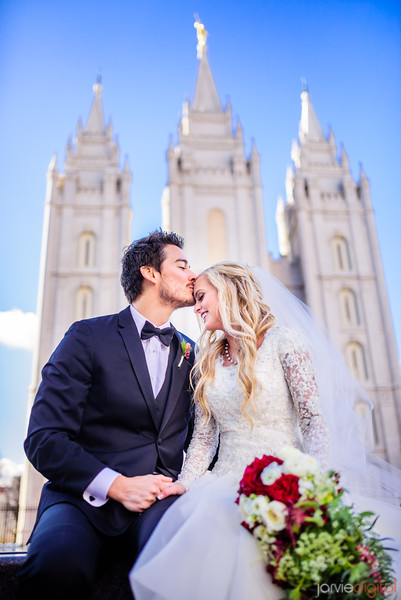DON'T MISS OUT! If you enjoy this episode, you'll love Jennifer's courses, which you can get at 20% off up until Valentines day.
You Don’t Love Me...
“I feel so ugly and unattractive,” my wife confided to me one day early in our marriage.
“What? Why on earth would you think that? You’re GORGEOUS!”
“My friends keep telling me that their husbands can’t keep their hands off them. They’re always wanting sex. You don’t ever really initiate, so I figured you just aren’t attracted,” she replied.
I was stunned.
That was not at all how I felt! I had no idea my wife was suffering like this. Her story of what was going on in our marriage and my story did NOT match up.
“I have heard so many stories of sex-crazed, selfish husbands who are aren’t very sensitive to the needs or desires of their wives,” I said. “I didn’t want you to feel used or taken advantage of, so I’ve just been trying to let you dictate the pace.”
“Wait, really?” she asked.
This moment was a huge step forward in our relationship. We learned how easy it is to be living in two completely different realities at the exact same time all because of the stories we tell ourselves about the events that were taking place in our marriage.
The Power of Stories
Human beings are storytellers. It’s in our spiritual DNA. We make up stories (like “My husband doesn’t love me” or “My wife will be love me more if I’m not like ‘all the other guys’”) every day to make our experiences make sense.
We take the facts, and we overlay them with our own assumptions and guesses and believe them to be the truth.
The ability to tell stories to create meaning is a divine characteristics. Nearly everything we know about the nature of God has been taught to us first through stories. Even Christ’s most famous and compelling teachings were presented in the form of a story.
Stories are powerful. When a story is based in truth, it resonates with our soul. These truth-based inner-narratives inspire growth, unlock doors of opportunity and progress, and can even transform a life.
Stories that aren’t based on truth will completely undermine your relationship with God, destroy your marriages, and corrode our life.
Part of learning our journey to become more like Christ involves learning to tell powerful, truth-based stories, and identify when our own stories and the stories of others are based on falsehoods.
Truth vs. Lies
It’s easy to get caught up in the cultural “False Traditions” of Mormonism. The lies we believe about sex and marriage can be particularly damaging to our eternal progression.
Lies will keep you stuck.
The truth will set you free.
In this podcast episode, Dr. Jennifer Finlayson-Fife points out some of the lies we often get fooled into believing that kill the progress and intimacy in our marriage.
“Conflict in my marriage means either I’m broken or my marriage is broken”
The purpose of marriage is to contribute to our growth and progress as human beings. Growth only occurs in the presence of resistance.
When you tell yourself the story that conflict means “we have a bad marriage,” you’re missing an opportunity for growth. Instead, ask the question “What can I learn from the pain or discomfort I’m experiencing?” or “What is this trial teaching me.”
If you refuse to confront the trials, you’ll never grow from them, and your progress is thwarted.
Conflict is part of being married. It doesn’t mean you’re broken. It means you’re human.
“My sexuality is evil and I need to tolerate it”
Many of us were taught really unhealthy things about virtue and the Law of Chastity growing up.
Maybe you were taught that pleasure is bad, and you should avoid it.
You might have been told that the “carnal desires” you feel towards other people are evil, and come from the natural man.
You might have been taught that sex is only for the creation of the family.
Regardless of what you were taught, I’d recommend running a quick test for truthfulness on your beliefs. Ask yourself, “Do my beliefs about sex, desire, and passion help me feel closer to my partner in my marriage or do they disconnect me from my partner? Do my beliefs bring out my godlike qualities of generosity, kindness, compassion, love and goodness, or do they bring out your more selfish, fearful, and cruel side?”
Our goal is to emulate God in all we do. If what you’ve been taught doesn’t accomplish this goal, it’s your job to do the work to shift your perspective and change your beliefs.
“My partner belongs to me”
We have a deep desire to belong to someone and to have them belong to us. We want to feel connected on a level that is unlike our connection with anyone else on earth. We want to know and be fully known. We want to love and be fully loved.
But we also have a fierce need to belong to ourselves. We want to have a sense of independence and uniqueness. We want to feel like we have a sense of choice and control over our lives.
Sometimes we don’t want our partner to belong to themselves because we are scared to belong to ourselves. We don’t know who we are if we aren’t a spouse or a parent. In the name of love we suck the life out of our spouse. We think, “You validate me by wanting me when I want to be wanted or don’t. I love you because I want you to reinforce me.”
We allow our fear to protect us from our discomfort and our personal progression rather than confronting our challenges head-on.
Just The Beginning
These lies that Dr. Finlayson-Fife outlined are just the tip of the iceberg.
You tell yourself all kinds of stories every single day. The stories you tell yourself shape what you believe about others, and what you believe about yourself.
And you have the power to choose your stories!
What stories would you benefit hearing more of? What stories would you benefit by giving up? Share your thoughts and ideas in the comments!
About Our Guest
Dr. Finlayson-Fife is a licensed psychotherapist with a Ph.D in Counseling Psychology from Boston College. She wrote her dissertation on LDS women and sexuality, has taught college-level courses on human sexuality, and currently teaches online and community-based relationship and sexuality courses to LDS couples. She is a frequent contributor on the subjects of sexuality, mental health, and spirituality to LDS-themed blogs, magazines, and podcasts. She maintains a private practice in Chicago where she lives with her husband and three children. She is an active member of the LDS church.
Check out Jennifer's online courses:
Get 20% off Jennifer's courses until Valentines Day! If you enjoyed this episode, these courses will definitely change your life.
Show Notes
2:35 Jennifer’s workshop “Art of Desire”
4:15 The meaning frames that humans create to justify or explain their circumstances
6:45 It is necessary to integrate your god-given sexuality
8:00 “False tradition” says that sexuality is a necessary evil
8:35 Mormon theology for sexuality
9:10 Ways to be evil
10:15 Sexuality and goodness
11:15 Adjusting to marriage
14:00 Steps to cultivating god-given desire
14:30 we run our own sexuality, it doesn’t run us
16:45 What happens when you’re afraid of your sexuality (repression or indulgence)
18:15 Sexual contract - marriage is a chosen relationship; to know and be known
20:45 Marriage pushes your development
21:30 What can my marriage teach me?
22:15 “Ticks and moles”
23:10 You live in the environment that you create
23:45 We self deceive and collude in not dealing with troubles (polite marriage vs intimate marriage)
24:15 Measuring quality of marriage
25:30 Can there be room for the best of both partners? We often want our own limitations to prevail while expecting our spouses’ limitations to disappear
26:00 Victim mentality (guilt your spouse into submission) It may look like there’s peace, but there will be underlying anger and resentment.
27:00 Unrealistic fantasy of “oneness”
28:00 Using the validation of others to sustain your own sense of self
28:50 “In the name of Love, we can sometimes suck the lives out of our spouses” (validate me, reinforce me)
29:45 Choose to love someone, limitations and all
30:00 Breaking the bond of using someone else for your own validation
31:40 Even if your partner says all the right words, it won’t land anywhere if you don’t feel it in your heart
32:30 Taking accountability for your own life
33:15 “False tradition” if women want to develop vs nurture, then they are selfish (we’ve come to earth to develop and create)
34:30 Create a sense of self
34:50 Self deception is Satan’s path
35:20 Taking responsibility for your own emotions
37:25 Don’t try to manage your partner in order to manage yourself. Trying to control things we have no control over, like our spouses, distracts us from focusing on what we CAN control, like ourselves
38:45 What are my blind spots that I have yet to confront?
39:00 One of the kindest things you can do for your partner is to manage yourself (anxiety is infectious). This allows them to in turn manage THEMSELVES
40:20 Ask yourself “what am I pretending not to know about my role in these circumstances”
41:00 Confronting yourself is a scary thing, especially in a sexual relationship
42:00 Own your own desire and ask for what you want vs covert contracts
42:45 Owning your desire exposes you to the possibility of rejection. This is true intimacy and true vulnerability
43:20 “you’re not allowed to complain about not getting something you’ve never asked for”
44:05 it’s easier to sit in an entitled resentment thinking “you owe me” instead of asking for what you want and risking not getting it.
44:45 When we don’t take responsibility of our desires, we stunt the development of our marriages and of ourselves
44:55 if you’re not getting what you want in your marriage - #1 have you asked for it? #2 are you doing your part to create the possibility of getting it?
46:40 We’re good at thinking about all of the things we think we are owed, but not so good at confronting our part in he negative reality we are living in
47:10 Make it easy for your partner to give you what you want
48:25 The theology of Mormonism contains the architecture for creating amazing marriages
49:15 you come to know God through behavior, not ideas. It’s the way you act in our marriage that is a reflection of how much you understand God.








